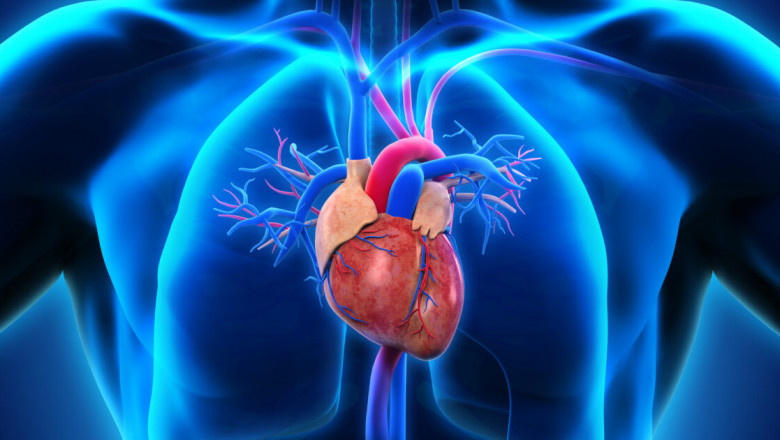views

Heart disease is the leading cause of death worldwide, yet many people fail to recognize its earliest symptoms. While heart attacks and strokes often come without warning, your body may actually be sending subtle signals long before a serious event occurs. Recognizing these early signs of heart disease can save your life or the life of someone you love.
In this article, we'll break down the most common early signs of heart disease that most people ignore — and explain why it’s critical to pay attention to them.
What is Heart Disease?
Heart disease refers to a range of conditions affecting the heart and blood vessels. The most common type is coronary artery disease (CAD), which occurs when the arteries supplying blood to the heart become narrowed or blocked due to plaque buildup. Over time, this can lead to heart attacks, arrhythmias, or heart failure.
Other types of heart disease include:
-
Arrhythmias (irregular heartbeat)
-
Heart valve disease
-
Heart failure
-
Congenital heart defects
Understanding the early warning signs of these conditions can lead to early diagnosis, better treatment, and a longer life.
1. Fatigue and Weakness
One of the most commonly ignored symptoms of heart disease is unusual fatigue, especially in women. Feeling tired after physical activity is normal, but if you're feeling drained after mild exertion—or even at rest—it could signal a reduced blood flow to your heart.
Why it Happens:
When your heart isn’t pumping efficiently, your muscles and organs don’t get enough oxygen, leading to fatigue and general weakness.
2. Shortness of Breath
Dyspnea, or shortness of breath, may feel like you can’t catch your breath even when you’re not physically active. This can be an early indicator of congestive heart failure or coronary artery disease.
When to Worry:
If you feel breathless while lying down, during simple activities like walking, or without a clear reason, it's important to talk to your doctor.
3. Chest Discomfort
While crushing chest pain is a well-known heart attack symptom, mild chest discomfort is often ignored. People may describe it as pressure, squeezing, or fullness in the center of the chest that comes and goes.
Important Note:
Not all heart-related chest pain is dramatic. Sometimes, it feels like heartburn or indigestion.
4. Irregular Heartbeat
Occasional skipped beats are usually harmless, but frequent palpitations or a racing heartbeat may signal atrial fibrillation or other arrhythmias.
Seek Help If:
-
Your heartbeat feels fast or erratic
-
You feel dizzy or lightheaded during episodes
-
You have chest pain or fainting spells
5. Swelling in the Legs, Ankles, or Feet
Fluid retention (edema) in the lower body can occur when the heart doesn’t pump blood effectively. This causes fluid to back up in the legs and feet.
Associated Conditions:
Swelling may indicate right-sided heart failure or valve problems.
6. Persistent Cough or Wheezing
A chronic cough that produces white or pink mucus can be a symptom of heart failure. It results from fluid accumulation in the lungs.
Other Clues:
-
Wheezing sounds when breathing
-
Trouble lying flat without coughing
7. Jaw, Neck, or Back Pain
Many people associate heart disease with chest pain, but discomfort can radiate to other areas — especially in women.
Symptoms to Note:
-
Pressure or pain in the lower jaw or neck
-
Pain that starts in the chest and spreads to the back or shoulders
8. Cold Sweats and Dizziness
Unexplained cold sweats or sudden dizziness could indicate an impending heart attack. These symptoms are especially dangerous when paired with nausea or lightheadedness.
9. Indigestion or Nausea
Heart-related chest discomfort is often misinterpreted as indigestion, especially in older adults. If you're experiencing unexplained stomach discomfort that doesn't respond to antacids or diet changes, it's worth getting checked.
10. Snoring or Sleep Apnea
Loud, chronic snoring or episodes of stopped breathing during sleep (sleep apnea) can put stress on your heart. Over time, untreated sleep apnea can increase your risk of high blood pressure, arrhythmias, and stroke.
Why Early Detection Matters
Early intervention is the best way to prevent severe complications of heart disease. Many heart conditions are manageable with lifestyle changes, medications, and regular monitoring if caught in the early stages.
Steps to Take:
-
Monitor your blood pressure and cholesterol
-
Maintain a heart-healthy diet
-
Exercise regularly
-
Avoid smoking and limit alcohol
-
Get regular checkups, especially if you have a family history of heart disease
When to See a Doctor
If you notice any of the signs above — especially if they’re new, frequent, or worsening — don’t ignore them. It’s better to rule out heart disease early than to wait until it’s too late.
Conclusion
Heart disease often hides behind common symptoms that can easily be mistaken for everyday issues like fatigue, indigestion, or stress. But paying attention to your body and recognizing the early signs of heart disease can make a life-saving difference.
If you're unsure whether what you're feeling is serious, remember this rule: when in doubt, check it out.












Comments
0 comment